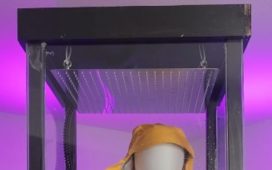[ad_1]
A former Disney Channel star is betting big on space by investing in a neglected piece of the industry – ground infrastructure.
Bridgit Mendler, 31, known for her roles in Wizards of Waverly Place and Good Luck Charlie, spoke at the TechCrunch Disrupt event Monday to discuss her startup that focuses on building critical communication between satellites and Earth.
Northwood Space aims to develop ‘a data highway between Earth and space,’ providing much-needed connectivity for businesses looking to launch into the final frontier.
‘To actually fulfill the benefit of people in the world, you have to invest in unsexy problems, like building a ground network, the actress-turned-CEO said.
‘I personally think that’s pretty sexy and fun. It’s absolutely not what most people think of when they think of the space industry.’
California-based Northwood Space is developing ground stations to be mass-produced and gambling on its phased array-based system, Portal, which connected to its first satellite last month.
‘The vision is a data highway between Earth and space,’ she said.
‘Space is getting easier along so many different dimensions but still, the actual exercise of sending data to and from space is difficult.
‘You have difficulty finding an access point for contacting your satellite.’

Bridgit Mendler, 31, known for her roles in Wizards of Waverly Place and Good Luck Charlie (pictured), spoke at the TechCrunch Disrupt event Monday to discuss her startup that focuses on building critical communication between satellites and Earth
Mednler has spent the last few years earning degrees from MIT, the University of Southern and Harvard Law, where she is not working on her PhD.
But after spending time at the Federal Communications Commission’s new Space Bureau, she ‘completely fell in love with space law.’
Northwood Space was founded in 2023, which focuses on companies with satellites in low Earth orbit but may not have the funds for advanced communication services.
Mendler co-founded the company with her husband Griffin Cleverly, who will serve as Chief Technology Officer, and Head of Software Shaurya Luthra.
‘Traditionally when I wanted an antenna or site to use, I would first have to ask, ‘Do you have availability, or is it already rented out to everyone else in the world?’ A lot of times very key sites were already rented out,’ Luthra told CNBC.
In the past four months, the company has designed, built and tested its array system, compared to similar examples of phased array projects that have taken years to develop.
‘Every aspect of this antenna, from the beamforming software to the custom electronics, was designed in-house to optimize for efficiency,’ according to Northwood Space.
‘This will continue to be a critical aspect of Northwood’s manufacturing approach as we set out to replicate our phased array systems, called Portals, at new site deployments beginning in 2025.’

California-based Northwood Space is developing ground stations to be mass-produced and betting on its phased array-based system, Portal, which connected to its first satellite last month
‘I think there’s been technology shifts that have been kind of difficult to bring to life until very recently,’ Mendler said at the TechCrunch event.
‘So for us, that was something we were kind of tracking with Northwood.
‘There’s this solution that we know we want to build towards; you know, exponential growth needs exponential tech.
‘We need some kind of exponential tech on the ground side to be able to accommodate the growth in the space industry.’
She revealed earlier this year that the name of the company comes from a New Hampshire lake where the idea for the company first took root, while spending time with her family there during the COVID-19 pandemic.
‘While everybody else was making their sourdough starters, we were building antennas out of random crap we could find at Home Depot … and receiving data from [National Oceanic and Atmospheric Administration] satellites,’ Mendler said.
‘For me, why the ground-side matters is because it actually is about bringing the impacts of space home to people,’ she added.
Cleverly added that there is now a ‘colossal’ amount of data travelling to and from satellites and their company wants to make it more efficient to deliver the data.
‘We need an approach so that those companies can get the data down reliably and in the quantities that they need,’ he said.
They want to be able to deliver these ground stations, ‘within days, not months,’ with Luthra adding it takes 18 months for an antenna to be installed.
The company aims to be in the same vein as Amazon Web Services or Microsoft’s Azure, which provides server space so companies don’t have to build their own.
‘It allows space companies to be much more responsive to use cases and missions that pop up,’ Cleverly added, with the company hoping to conduct their first test to a spacecraft in orbit later this year.
[ad_2]
READ SOURCE













